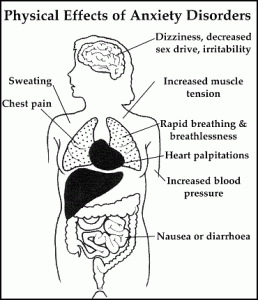What does Emma Stone Have in Common With Carrie Underwood and Amanda Seyfried? Panic Attacks!

If you’ve ever had a panic attack, you know how scary it can be- your heart’s racing, your fingers tingle, it’s hard to breathe, and you’re absolutely convinced you are going to die!
You’d think that those used to the spotlight wouldn’t be subject to this kind of problem.
However, a number of celebrities have come forth to discuss their experiences with the disorder. The most recent is actress Emma Stone.
Emma Stone has really made a name for herself the past few years. In 2011, she starred in the films Crazy, Stupid, Love and The Help, both of which were well received by critics and commercial successes. She is currently promoting her role as Gwen Stacy, along side Andrew Garfield in the upcoming summer block-buster, The Amazing Spider-Man.
In this month’s Vogue magazine, Stone opened up about her history of panic attacks, which started when she was only 8 years old.
I was just kind of immobilized by it. I didn’t want to go to my friends’ houses or hang out with anybody, and nobody really understood.
Stone attributes talk therapy and her decision to pursue acting as the way she worked through it.
[Being on stage] gave me a sense of purpose. I wanted to make people laugh. Comedy was my sport. It taught me how to roll with the punches. Failure is the exact same as success when it comes to comedy because it just keeps coming.
Stone admits she still has occasional panic attacks, but deals with them by baking, because “It seemed like it made me feel, if I put these in, I’ll know what the outcome is.”
Twenty Things You Should Know About Panic Disorders
1. Panic disorder is a real illness that can be successfully treated.
2. Panic disorder affects about 6 million American adults.
3. They are twice as common in women as men.
4. Panic attacks are characterized by sudden attacks of terror.
5. It is unknown what causes panic disorders.
 6. They are usually accompanied by a pounding heart, sweatiness, weakness, faintness, or dizziness.
6. They are usually accompanied by a pounding heart, sweatiness, weakness, faintness, or dizziness.
7. Other symptoms include:
- chills
- numbness and tingling of the hands
- nausea
- chest pain, or smothering sensations
8. Sufferers often experience a sense of unreality, a sense of impending doom, or a fear of losing control.
9. A fear of one’s own unexplained physical symptoms is also a symptom of panic disorder. People having panic attacks sometimes believe they are having heart attacks, losing their minds, or on the verge of death.
10. Panic attacks can occur at any time of the day.
11. People who have full-blown, repeated panic attacks can become very disabled by their condition.
12. They start to avoid places or situations where panic attacks have occurred.
13. Suffers lives can become so restricted that they avoid normal activities, such as grocery shopping or driving.
14. About one-third become housebound or are able to confront a feared situation only when accompanied by a spouse or other trusted person.
15. This symptoms is called agoraphobia, or fear of open spaces (originally taken from the Greek expression for “fear of the market place”).
16. Since many of these symptoms mimic physical disorders, patients often have repeated physician or emergency room visits before they are diagnosed.
17. Patients with panic disorder usually respond well to medications, talk therapy, or both.
18. Medications for panic disorder include antidepressants and anti-anxiety medications.
19. Additional measures to reduce stress, including meditation, yoga, biofeedback, and so on are also helpful in reducing anxiety and panic attacks.
20. You can learn more about panic attacks and panic disorder by clicking here to go to the Resounding Health Casebook on the topic.



























0 comments